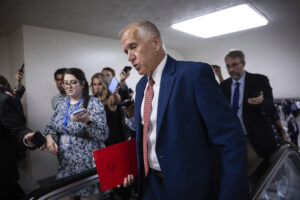Congress
‘Trump movement’ turns on Cornyn, poll finds
MAGA loyalists have put Sen. John Cornyn’s reelection campaign in a Texas-size hole.
An early May poll commissioned by the American Opportunity Alliance, a major conservative funding group linked to megadonor Paul Singer, shows the Texas Republican down 17 points in a head-to-head primary matchup with state attorney general Ken Paxton.
Below the top-line of Paxton’s 52-percent-to-35-percent advantage, the poll found a clear divide between those voters who were defined as “Trump Movement” voters and those who were “Traditional Republicans.” In the former category, which made up of 58 percent of the electorate, Paxton had a 45-point lead. Among the latter, who made up only 35 percent of voters, Cornyn had a 27-point lead.
The findings reflect a increasingly prominent divide among Republican primary voters in Texas where an insurgent hard-right faction has been steadily gaining ground in recent years while ousting more traditional GOP elected officials. Paxton, who has faced federal investigation and impeachment, has long been a darling of right-wingers in Texas, while Cornyn — first elected to the Senate in 2002 — is considered a pillar of the establishment GOP.
In a speculative three-way race with GOP Rep. Wesley Hunt, who is exploring a bid, the margin barely narrowed with the Cornyn trailing Paxton, 43 percent to 27 percent, with Hunt receiving 14 percent.
There was some good news for the incumbent in the poll. Despite trailing Paxton significantly, he is still viewed favorably by the Republican primary electorate in the Lone Star State — just not as favorably as the state attorney general.
The poll, conducted from April 29 through May 1 among 800 Republican primary voters, is among a series of public and private surveys all showing Cornyn significantly trailing Paxton. They have sparked increasing concern from national Republican operatives about a potentially ugly and costly primary, as well as the possible elevation of a scandal-plagued candidate who might be at risk in a general election.
The American Opportunity Alliance’s interest in the race is notable; it’s one of the key donor consortiums in Republican politics and its members including Singer and Chuck Schwab are some of the biggest funders on the right.
Congress
Senate Republicans reject Democrats’ accounting baseline challenge
Republicans batted down a Democratic challenge to the GOP’s use of “current policy baseline,” which zeroes out the cost of $3.8 trillion of tax cut extensions in the GOP megabill. The 53-47 vote approved the use of the maneuver along party lines.
Senate Democrats initiated four parliamentary inquiries on Monday morning in an attempt to show that the tactic is akin to a nuclear option that would blow-up longstanding budget rules.
“Republicans are doing something the Senate has never done before, deploying fake math, accounting gimmicks, to hide the true cost of the bill,” Senate Minority Leader Chuck Schumer said on the floor. “To vote yes on this, make no mistake about it my colleagues, will in a dramatic way further erode the Senate.”
Sen. Lindsay Graham (R-S.C.) countered that he has the authority as Budget Committee chair to determine the budget baseline used to implement and score provisions in the sprawling border, energy and tax legislation.
“I’ve never felt better. I’ve been wanting to do this for, like, a long time,” Graham said.
Congress
Vote-a-rama, last hurdle before megabill’s Senate approval, is underway
The Senate has kicked off “vote-a-rama” — the marathon of amendment votes on the Republicans’ domestic policy megabill.
The first vote wasn’t on adoption of a specific amendment, but instead on whether Republicans can use a controversial accounting tactic to zero out the $3.8 trillion cost of extending President Donald Trump’s 2017 tax cuts in their massive domestic policy bill.
Republicans assert that Budget Chair Lindsey Graham (R-S.C.) has the unilateral power to change the accounting method to the so-called current policy baseline. Yesterday, Senate Minority Leader Chuck Schumer moved to force a simple-majority vote on undoing the change; it’s expected to fail along party lines.
“Every senator will soon have an opportunity to reject this nonsense and vote for common-sense budgeting,” Schumer said on the floor Monday morning. “Americans will be watching.”
The vote has high stakes for Republicans because without the accounting change, Finance Committee provisions would increase the deficit by much more than the $1.5 trillion cap set out in the budget blueprint Senate Republicans adopted earlier this year.
Ahead of the voting, Senate Majority Leader John Thune underscored the need to address the expiring tax cuts: “This is about extending that tax relief, so the same people that benefited from it back in 2017 and for the last eight years don’t end up having a colossal, massive tax increase hitting them in the face come Jan. 1.”
The Senate will then move on to rapid-fire amendment votes from both Democrats and Republicans on curbing a key Medicaid funding mechanism, doubling the stabilization fund for rural hospitals to $50 billion, changing the bill’s artificial intelligence provisions and softening deep cuts to wind and solar energy.
“We will see, once and for all, if Republicans really meant all those nice things they’ve been saying about strengthening Medicare, about protecting middle class families, or if they were just lying,” Schumer said.
The votes are expected to go all day Monday and potentially into Tuesday morning. Vote-a-ramas are rarely held during daylight hours — majority-party leaders like to use fatigue as a weapon to bring things to a close — but Senate GOP leaders chose to give lawmakers a reprieve after multiple late nights.
CORRECTION: An earlier version of this story misstated Senate Minority Leader Chuck Schumer’s title.
Congress
Capitol agenda: Thune heads into a perilous vote-a-rama
The Senate’s “big, beautiful” vote-a-rama starts in just two hours — and nobody knows how it’s going to end.
Senate Majority Leader John Thune can only lose one more vote with Sens. Rand Paul (R-Ky.) and Thom Tillis (R-N.C.) already opposed. As Senate GOP leaders scramble to strike deals to keep the bill on track, House Republicans are drawing red lines, with fiscal hawks threatening to tank the bill over the Senate’s budget framework and moderates balking at the provider-tax crackdown.
Here are the big fights we’re watching when amendment votes kick off at 9 a.m., leading to a final vote on passage late Monday or early Tuesday:
Medicaid: GOP Sen. Rick Scott’s proposal to curb a key Medicaid funding mechanism after 2030 has Thune’s support as part of a deal struck to get the Florida senator and a handful of other holdouts to advance the megabill to debate.
If it fails, it could cost leadership some fiscal hawks, though Sens. Scott and Ron Johnson (R-Wis.) refused to go there Sunday night. If it passes, it could alienate so-called Medicaid moderates. One of them, Sen. Susan Collins of Maine, filed an amendment that would double the stabilization fund for rural hospitals to $50 billion, and pay for it by adding a 39.6-percent bracket on earners making over $25 million.
Medicaid moderates could also try to further water down the bill’s cut to the provider tax. Keep an eye on Tillis, now unburdened by a reelection bid, who slammed the Medicaid cuts in a fiery floor speech Sunday and might jump in again. Another key player to watch is Sen. Lisa Murkowski and whether her support slips after the parliamentarian derailed Medicaid-payment provisions aimed at winning over the Alaskan. The parliamentarian also, as of early this morning, had yet to rule on food-aid waivers for Alaska that could affect Murkowski’s vote.
Green credits: Moderates including Tillis and Sen. John Curtis (R-Utah) could offer amendments to soften the bill’s deep cuts against wind and solar energy, including its crackdown on IRA credits and a new excise tax. That could provoke a fight with House conservatives and the White House, which have pushed for aggressive rollbacks.
AI: Commerce Chair Sen. Ted Cruz (R-Texas) and Sen. Marsha Blackburn (R-Tenn.) are pitching a plan to cut the megabill’s 10-year moratorium on state enforcement of AI laws in half and make accommodations for internet protections.
The grand finale could be a manager’s amendment that House GOP leaders are pushing for to further resolve differences between the chambers and speed the bill to Trump by Friday. The House is scheduled to vote as soon as Wednesday at 9 a.m.
What else we’re watching:
— Farm bill fight: Dozens of agriculture groups are urging senators to oppose an amendment from Sen. Chuck Grassley (R-Iowa) that would limit income thresholds of farmers who can receive federal aid. A host of farm-state GOP senators also oppose Grassley’s push, according to three people granted anonymity. Some are concerned that liberal senators could join with conservative fiscal hawks to pass the amendment.
— Solar and wind tax backlash: The U.S. Chamber of Commerce and the Solar Energy Industry Association are slamming a new addition to the megabill that would tax solar and wind projects that have components from foreign sources, including China. “Taxing energy production is never good policy, whether oil & gas or, in this case, renewables,” Chamber executive vice president and chief policy officer Neil Bradley wrote on X.
— Campaign announcements: Rep. Don Bacon is expected to announce his retirement Monday, according to two people familiar with his plans. The centrist Republican’s Nebraska seat is a prime pickup opportunity for Democrats; it’s one of only three GOP-held districts Kamala Harris won in 2024. Meanwhile GOP Rep. Dusty Johnson is expected to announce a bid for South Dakota governor on Monday, according to two people familiar with his planning. He’ll be the eighth House Republican to run for higher office in 2026.
Jordain Carney, Meredith Lee Hill, Mohar Chatterjee and Josh Siegel contributed to this report.
-

 The Josh Fourrier Show8 months ago
The Josh Fourrier Show8 months agoDOOMSDAY: Trump won, now what?
-
Uncategorized8 months ago
Bob Good to step down as Freedom Caucus chair this week
-

 Politics8 months ago
Politics8 months agoWhat 7 political experts will be watching at Tuesday’s debate
-

 Politics8 months ago
Politics8 months agoHow Republicans could foil Harris’ Supreme Court plans if she’s elected
-
Economy8 months ago
Fed moves to protect weakening job market with bold rate cut
-
Economy8 months ago
It’s still the economy: What TV ads tell us about each campaign’s closing message
-

 Politics8 months ago
Politics8 months agoRFK Jr.’s bid to take himself off swing state ballots may scramble mail-in voting
-
Uncategorized8 months ago
Johnson plans to bring House GOP short-term spending measure to House floor Wednesday



